French and English during Norman Conquest诺曼征服时期的英语与法语
第二章:中世纪英语文学
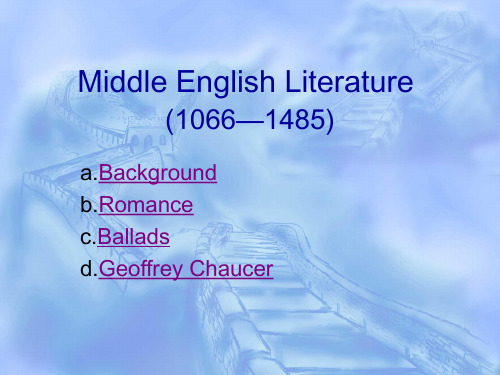
If the epic reflects a heroic age, the romance reflects a chivalric one. Most of the English romances deal with three major themes: a) “the Matter of Britain” — about the Arthurian legend b) “the Matter of France” — about stories concerning Charlemagne and his knights c) “the Matter of Rome” —about tales of antiquity, from the Trojan war to the feats of Alexander the Great
By the end of 14th century, when Normans and English intermingled, English was once more the dominant speech in the country. But by then the English language had already been totally different from Old English, for in the three centuries after 1066 the language had undergone gradual but radical and extensive changes, as not only were borrowed in the course of time thousands of words from French and through French from Latin and also Greek, but many old inflectional forms of native English words had been dropped and formal grammar of the past had become considerably simplified. e.g. Words from Latin: angel/ monk/ pope/ candle English: calf swine (old use or lit, pig) sheep build ask wet French: veal pork mutton construct inquire humid The English language in this transitional stage from Old English to modern English, through some four centuries (from 12th to 15th) of development and change, has generally been known as Middle English.
(完整)高级英语1Unit7FrenchandEnglish翻译
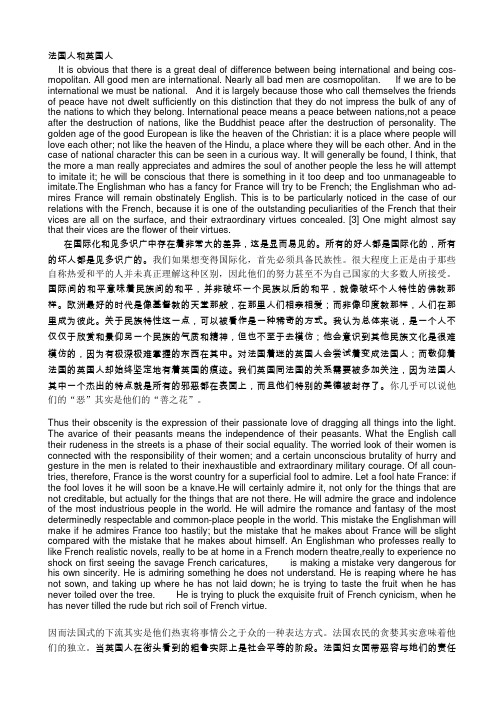
法国人和英国人It is obvious that there is a great deal of difference between being international and being cos-mopolitan. All good men are international. Nearly all bad men are cosmopolitan. If we are to be international we must be national. And it is largely because those who call themselves the friends of peace have not dwelt sufficiently on this distinction that they do not impress the bulk of any of the nations to which they belong. International peace means a peace between nations,not a peace after the destruction of nations, like the Buddhist peace after the destruction of personality. The golden age of the good European is like the heaven of the Christian: it is a place where people will love each other; not like the heaven of the Hindu, a place where they will be each other. And in the case of national character this can be seen in a curious way. It will generally be found, I think, that the more a man really appreciates and admires the soul of another people the less he will attempt to imitate it; he will be conscious that there is something in it too deep and too unmanageable to imitate.The Englishman who has a fancy for France will try to be French; the Englishman who ad-mires France will remain obstinately English. This is to be particularly noticed in the case of our relations with the French, because it is one of the outstanding peculiarities of the French that their vices are all on the surface, and their extraordinary virtues concealed. [3] One might almost say that their vices are the flower of their virtues.在国际化和见多识广中存在着非常大的差异,这是显而易见的。
英国文学盎格鲁诺曼时期课件The Anglo-Norman Period

Arthurian romances/legends《亚瑟王传奇》 亚瑟是否为一历史人物仍无法确定。传说中亚瑟王 原为威尔士国王之子,年轻时以力拔千钧之势将 插入巨石的一柄大剑拔了出来,令许多武士望尘 莫及。他用这柄宝剑征服了苏格兰和爱尔兰,娶 了美貌的桂内薇尔为妻。 《亚瑟王传奇》...以传说中的英王亚瑟为中心的故 事体和中世纪的传奇故事。这些故事记述了亚瑟 王的一生、他的骑士们的奇遇,以及他的骑士朗 斯洛(Lancelot)和亚瑟的王后桂内薇尔 (Guinevere)的奸情。
• The new literature The literature which Normans brought to England is remarkable for its bright, romantic tales of love and adventure, in marked contrast with the strength and somberness of Anglo-Saxon poetry. Anglo-Saxon literature: Battle is a way of life. Strength, courage and loyalty are basic virtues for both kings and warriors. Beowulf shows how the primitive people wage heroic struggles against the hostile forces of the natural world under a wise and mighty leader.
Medieval romances or tales in verse, can be divided into three classes: • a. the Matter of France • b. the Matter of Greece & Rome • c. the Matter of Britain tales having their heroes Arthur and his knights of the Round Table.
英语的发展历史 英语作文

The English language has a rich and complex history that spans over a thousand years.Its development can be traced through several distinct phases,each marked by significant linguistic changes and influences from other languages.Old English4501100ADThe earliest form of English,known as Old English or AngloSaxon,emerged with the arrival of Germanic tribes such as the Angles,Saxons,and Jutes in Britain.This period saw the language heavily influenced by the Old Norse due to the Viking invasions.Middle English11001500The Norman Conquest in1066marked the beginning of the Middle English period. French became the language of the nobility and the church,significantly influencing English vocabulary and grammar.Chaucers The Canterbury Tales is a notable work from this period.Early Modern English15001700The Renaissance and the invention of the printing press by Johannes Gutenberg in the mid15th century contributed to the standardization of English.The works of William Shakespeare are the most famous from this era,and his plays and sonnets greatly enriched the language.Modern English1700to PresentModern English began with the Great Vowel Shift,which changed the pronunciation of long vowels.The British Empires expansion also led to the spread of English around the world,with regional variations emerging in countries like the United States,Australia, and India.Global EnglishIn the contemporary era,English has become a global lingua franca,used in international business,science,and diplomacy.The internet and globalization have further diversified the language,leading to new slang,jargon,and expressions.Influences on EnglishThroughout its history,English has borrowed words and phrases from many languages, including Latin,Greek,French,and more recently,languages from around the world. This has made English a flexible and expressive language.Standardization and VariationStandard English,as used in formal writing and speech,is based largely on the dialects of Englands southeast.However,there is considerable variation in spoken English,withregional accents and dialects reflecting local cultures and histories.The Future of EnglishAs a living language,English continues to evolve.New words are constantly being added, and the language adapts to new technologies and global communication.The future of English will likely see further diversification and innovation.Understanding the history of English not only provides insight into the languages development but also offers a lens through which to view the cultural and historical events that have shaped it.。
英国文学复习资料
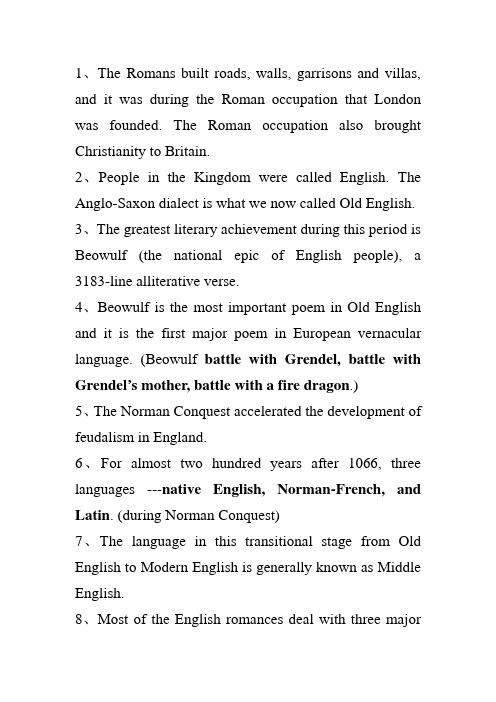
1、The Romans built roads, walls, garrisons and villas, and it was during the Roman occupation that London was founded. The Roman occupation also brought Christianity to Britain.2、People in the Kingdom were called English. The Anglo-Saxon dialect is what we now called Old English.3、The greatest literary achievement during this period is Beowulf (the national epic of English people), a 3183-line alliterative verse.4、Beowulf is the most important poem in Old English and it is the first major poem in European vernacular language. (Beowulf battle with Grendel, battle with Grendel’s mother, battle with a fire dragon.)5、The Norman Conquest accelerated the development of feudalism in England.6、For almost two hundred years after 1066, three languages ---native English, Norman-French, and Latin. (during Norman Conquest)7、The language in this transitional stage from Old English to Modern English is generally known as Middle English.8、Most of the English romances deal with three majorthemes: the Matter of Britain, the Matter of France, the Matter of Rome.9、The most important literary contribution of this period is Geoffrey Chaucer‟s The Canterbury Tales, which is a collection of twenty-four stories.10、Geoffrey Chaucer was the first great poet to write in the English language and exerted great influence on making the dialect of London the standard for modern English speech. Because of all this, Chaucer is considered as the “father of English poetry”.11、During the reign of Queen Elizabeth, there arose an intellectual movement known as the Renaissance, or the rebirth of letters. Renaissance first started in Italy in the 14th century and flourished in France, Germany, Spain and Britain in the 15th and 16th centuries. It saw the revival of art and sciences. People became interested in classical literature and many Greek and Latin works were translated into English. The most important characteristics of this movement are the exaltation of man and an absorption in earthly life.12、They believed that man could mould the worldaccording to his will and attain happiness by removing the external checks.13、Among the giants of the Renaissance :Thomas Moore wrote Utopia.Francis Bacon is best known for his essays. (Of Study)Edmund Spenser was considered as the “poet‟s poet”. His The Faerie Queene has been generally regarded as his masterpiece. The Faerie Queene represents Queene Elizabeth, and the poem thus sings praises to the greatest glorious queen.William Shakespeare wrote four tragedies: Macbeth, Hamlet(To be, or not to be, that is the question), Othello and King Lear. He is associated with the term soliloquy(内心独白).Christopher Marlowe(文学改革第一人) was the most gifted of the “university wits”, and the greatest pioneer of English drama. His works include Tamburlaine, The Jew of Malta and Doctor Faustus (the confinement to time 时间的局限性). Some of Doctor Faustus‟s utterances are great poetry expressed inforceful and beautiful blank verse(马洛是第一个提出)which became known as “Marlowe‟s mighty line”.14、John Milton was a great poet of the time. His masterpiece, Paradise Lost(in blank verse; 取材于the Old Testament 圣经旧约), is an epic.15、John Bunyan wrote The Pilgrim’s Progress. Its heroes, Christian(spiritual experience,Celestial City 圣城) and Faithful, came to Vanity Fair(名利场).16、The Pilgrim‟s Progress was written in the old-fashioned, medieval form of allegory and dream. The allegory depicts the Puritan struggle for freedom of worship, the eternal struggle of man to find unity with God. The purpose is to urge people to seek salvation through constant struggle with their weaknesses and social evils.17、The most noticeable are the Metaphysical Poets and the Cavalier Poets.18、The Metaphysical Poets: John Donne wrote The Flea.19、The Cavalier Poets: Robert Herrick wrote Gather Ye Rose Buds while Ye May (体现了要珍惜当下).20、The Enlighteners considered “enlightenment”or “education” of the people to be their chief mission. The eighteenth century is thus known as “the Age of Reason”.21、Neo-classicism in the early 18th century emphasis on reason rather than emotion; preference for elegance, correctness, symmetry, clearness and appropriateness; focus on “town”and “society”instead of nature or country things.22、The representatives of Sentimentalism were discontent with the social reality and the so-called reason which the Neo-classicists appealed to.23、Daniel Defoe (father of modern English novel) wrote Robinson Crusoe(鲁滨逊漂流记)which was sometimes regarded as the first English novel. Its hero stayed with Friday and is the prototype of a true empire-builder, a coloniser as well as a foreign trader.24、Jonathan Swift(以satire/irony 见长) wrote Gulliver’s Travels: a voyage to Lilliput; a voyage to Brobdingnag; a voyage to a Flying Island ---Laputa; a voyage to the country of Houyhnhnm that saved Gulliver from the human-like creatures, Yahoos.25、The most famous writers of the Pre-romanticism are William Blake and Robert Burns.26、William Blake wrote Songs of Innocence(from children‟s view) and Songs of Experience (from adults‟view). London and The Chimney Sweeper came from Songs of Experience.27、Robert Burns(苏格兰民族主义诗人)that are divided into 4 groups. The first is about love and friendship, like A Red, Red Rose and Auld Lang Syne (友谊地久天长,苏格兰方言). The second has to do with the Scottish life. The third deals with the theme of patriotism, like My Heart’s in the Highland(repetition and parallelism)attitude towards liberty, equality and fraternity(受美国独立战争和法国大革命影响)28. The influenced of the French Revolution soon spread its watchwords “Liberty, Equality and Fraternity”to almost every corner of the world.29. Romanticism in England began with the publication of William Wordsworth and Samuel Taylor Coleridge‟s Lyrical Ballads. And the essence of Romanticism is to reflect all that is spontaneous and unaffected in nature and man.30. Lake Poets(passive romanticists): Wordsworth, Coleridge and Southey. 31 .Active romanticists: Byron, Shelley and Keats.32 .William Wordsworth gives his famous definition of poetry:“poetry is the spontaneous overflow of powerful feelings; it takes its origin from emotion recollected in tranquility: the emotion is contemplated till, by a species of reaction, the tranquility gradually disappears, and an emotion, kindred to that which was before the subject of contemplation, is gradually produced, and does itself actually exist in the mind.”代表作:I Wondered Lonely as a Cloud33.George Gordon Byron (拜伦): In these works, the so-called Byronic hero, an idealized but flawed character, made its appearance.代表作:Don Juan(瑭瑝) Don Juan, the hero, has adventures to all the major European countries and takes part in various social, political and historical events. 34. Percy Bysshe Shelley(雪莱):Ozymandias、Ode to the West Wind(西风颂,if winter comes, can spring be far behind?功能:that both destroys and preserves the revival in the spring.)、To a Sky-Lark(致云雀)35.John Keats: Ode to a Nightingale(夜莺颂)、To Autumn(秋颂). Autumn, as it always is, represents growth, maturation, and ultimately an approaching death.36. Jane Austen:Pride and Prejudice(傲慢与偏见,中上层阶级)37. The mid-and-late 19th century is generally known as the Victorian age.38. William Makepeace Thackeray (萨克雷),代表作:《Vanity Fair》名利场》主人公:Amelia Sedley and Rebecca Sharp. It‟s name from the seat of corruption in Bunyan‟s allegory, Pilgrim‟s Progress.(选自班羊的《天路历程》。
Norman Conquest与中世纪英语
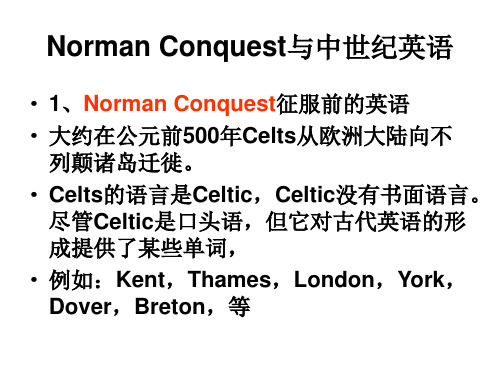
• Norman conquest给英国历史带来了深远 的影响,它使英国和欧洲大陆的关系更为 密切,促进了英国的经济和文化的发展, 也带来了Norman人的生活方式和法国的文 明。 • Norman人所使用的语言是法语的一种方言, 被称为Norman French,是属于拉丁语系 的一种语言,同英语的关系颇远。
• 由于大量的法语词持续不断地涌入,英语 中常有同源异体词(doubles)的现象发生。 因此往往有两个从同一个法语词借入的英 语单词,由于借入的时间不同,结果是: 不同发音、拼写有差别,词义也有所不同, • 如:warden,guardian; • catch,chase; • warranty,guarantee。
• 6)日常生活:dress,dinner,beef,collar, lace,fry,stable,park,forest。 • 7)舒适、排场及奢华为法语;简陋朴素为英语: • Norman French:castle, city, pleasure, chair • English:house,town,gladness,stool • 8)英语:cow,sheep, pig, calf, deer • 法语:beef,mutton,pork,veal,venison • 9)Norman风格的建筑及关于艺术:pillar, palace,tower,art,beauty,design
• 古代英语不是统一的语言,而是一种有明 显方言的语言。古代英语有4种方言,以西 Saxon方言为标准语,Beowulf即为古代英 语诗歌。 • 古代英语每个名词的格多达四种,即主格 (nominative)、对格(accusative)、 所有格(genitive)和与格(dative)。动 词也是凭借屈折形式表示人称、数、时态 及语气等,词尾变化十分繁杂。
英国文学史

III.Sir Gawain and the Green Knight
• 《高文爵士和绿衣骑士》 • It is a verse romance of 2530 lines, derived from Celtic legend.It was considered as the best of Arthurian romance. • A. Plot: • B. Story: • C. Themes: • D. Summary: •
A. Plot
• 1)The Green Knight’s challenge • 2) Sir Gawain’s hard journey • 3) Three days of Gawain’s sojourn(逗留) at the castle • 4) Gawain went to the Green Chapel
• William the Conqueror became the King of England in the year of 1066, thus feudalism was established in England. Middle English literature is a combination of French and Anglo—Saxon elements. English literature almost stood still. During the three centuries after the Norman Conquest, large scale of French literature was introduced into England. And because the church had a practical monopoly of literature during much of the Middle Ages, by far the largest proportion of surviving Middle English literature is religious. Literature that the Normans brought to England is remarkable for its bright, romantic tales of love and adventure, which can be seen in Romance, the most prevailing kind of literature in the feudal England.
英国文学发展史一览
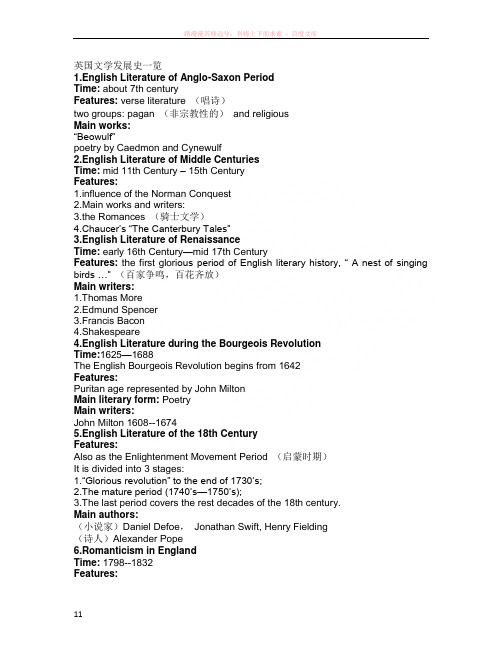
英国文学发展史一览1.English Literature of Anglo-Saxon PeriodTime: about 7th centuryFeatures: verse literature (唱诗)two groups: pagan (非宗教性的)and religiousMain works:“Beowulf”poetry by Caedmon and Cynewulf2.English Literature of Middle CenturiesTime: mid 11th Century – 15th CenturyFeatures:1.influence of the Norman Conquest2.Main works and writers:3.the Romances (骑士文学)4.Chaucer’s “The Canterbury Tales”3.English Literature of RenaissanceTime: early 16th Century—mid 17th CenturyFeatures: the first glori ous period of English literary history, “ A nest of singing birds …” (百家争鸣,百花齐放)Main writers:1.Thomas More2.Edmund Spencer3.Francis Bacon4.Shakespeare4.English Literature during the Bourgeois RevolutionTime:1625—1688The English Bourgeois Revolution begins from 1642Features:Puritan age represented by John MiltonMain literary form: PoetryMain writers:John Milton 1608--16745.English Literature of the 18th CenturyFeatures:Also as the Enlightenment Movement Period (启蒙时期)It is divided into 3 stages:1.“Glorious revolution” to the end of 1730’s;2.The mature period (1740’s—1750’s);3.The last period covers the rest decades of the 18th century.Main authors:(小说家)Daniel Defoe,Jonathan Swift, Henry Fielding(诗人)Alexander Pope6.Romanticism in EnglandTime: 1798--1832Features:1.是英国文学史上诗歌最为繁盛的时期;2.分为消极和积极两组。
- 1、下载文档前请自行甄别文档内容的完整性,平台不提供额外的编辑、内容补充、找答案等附加服务。
- 2、"仅部分预览"的文档,不可在线预览部分如存在完整性等问题,可反馈申请退款(可完整预览的文档不适用该条件!)。
- 3、如文档侵犯您的权益,请联系客服反馈,我们会尽快为您处理(人工客服工作时间:9:00-18:30)。
4. Knowledge of French Among the Middle Class
• We have mentioned that by the end of the twelfth century the knowledge of English was not unusual among members of the highest class, it seems equally clear that the knowledge of French was often found somewhat further down in the social scale----- the Middle Class-----who were brought into association with the governing class
• While English was reduced English as a tongue used only by common illiterate people and not fit for writing.
2.2 Fusion of the French and English Over Time
Evidence: William the Conqueror buried in Normandy, he divided his possessions at his death, giving Normandy to his eldest son, and England to his second son. Except for Henry I, no English king till Edward IV (1461-1483) sought a wife in England.
2.2.1 Knowledge of English Among the Upper Class
Conclusion • From these instances, we can know that a knowledge of English was not uncommon, though not universal among the Upper Class at the end of the twelfth century.
French and English During Norman Conquest
1.The History Background
1.1 The Normans 1.2 The Norman Conquest
2. Language Contact During Norman Conquest
2.1 The Domination of French in England 2.2 Fusion of the French and English Over Time
2.2.1 Knowledge of English Among the Upper Class
• French was the language of the court and the upper class while English was the language of common people.
4. Why didn’t French Replace English 5. Conclusion
1. History Background
1.1 The Normans
• The Normans were descended from Norse Viking(北欧海盗).
• Early 10th Century,they came and settled in northern France, which was called Normandy. • They themselves came to be called the Normans, meaning Northman. They adopted the French language and French civilization.
• William, the Duke of Normany ----- winner
The Norman Conquest
William was made king, crowned in westinster Abbey on Christmas Day, 1066.
2. Language Contact During Norman Conquest
2.1 The Domination of French in England
Elite Replacement: Eliminating the old English aristocracy Removing natives from high governmental and ecclesiastical office
• It is unreasonable to expect a conquered people to feel no resentment or the Norman never to be haughty or overbearing. • In a long period of time after the conquest, English and French were languages of two distinct ethnic groups, the two languages existed side by side without mingling. • Then, slowly they began to permeate each other.
2.2.1 Knowledge of English Among the Upper Class
Evidence
• English survived for a considerable time in some monasteries, at least until 1154. • Among churchmen the ability to speak English was fairly common. For example, the bishop of London, a man of Norman descent, was fluent in English, in addition to French and Latin.
• For almost three hundred years French was the official language of administration: it was the language of king's court, the law courts, the church, the army and etc. • The intellectual life, literature and education were in the hands of French-speaking people. • French, alongside Latin, was the language of writing.
• So it may be likely that many of the upper class would know some English when they ruled the country of which greater part of the population speak English.
2.2.1 Knowledge of English Among the Upper Class
Evidence
• It is reasonable to assume that a French soldier settled on a manor with a few hundred English peasants would soon learn the language of the people among whom his lot was cast.
4. Knowledge of Frencபைடு நூலகம் Among the Middle
Class
Evidence • Among the knightly class French seems to have been cultivated even when the mother tongue was English. In the reign of Henry II a knight in England got a man from Normandy to teach his son French. An ability to speak French was expected among this class.
• Frist, as rulers, they were sufficiently predominant to continue to use their own language. • second, the royal family were continentally minded. They felt more closely attached to their hometown than to England.
1.2 The Norman Conquest
• Edward the Confessor (1042—1066) −the English King
– died in 1066 without an heir – three claimants to the throne
• Harold(哈罗德) —the king's wife's brother. • William — Duke of Normandy, Edward's cousin • Harald (哈拉尔德)— King of Norway
